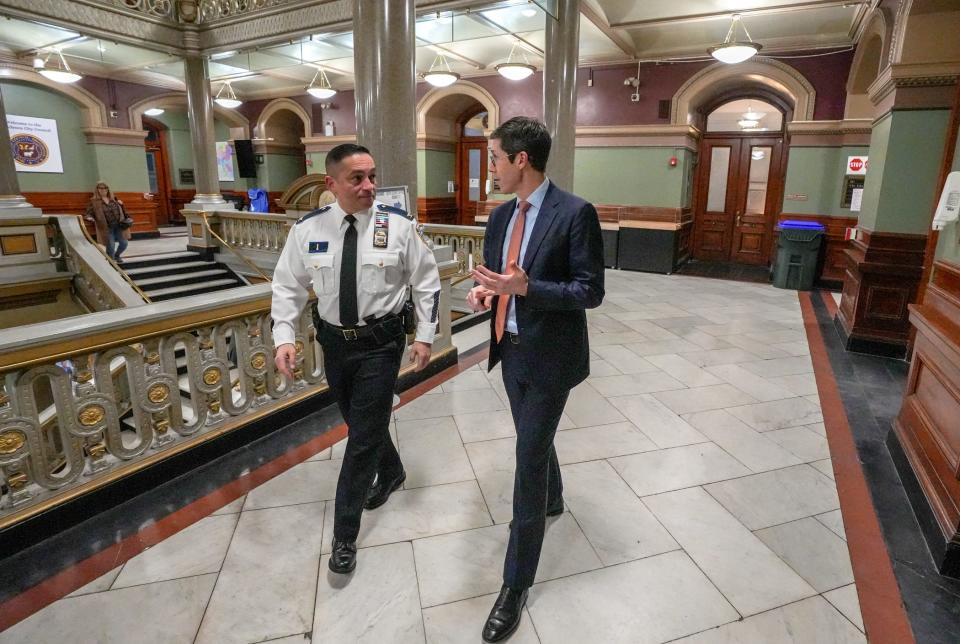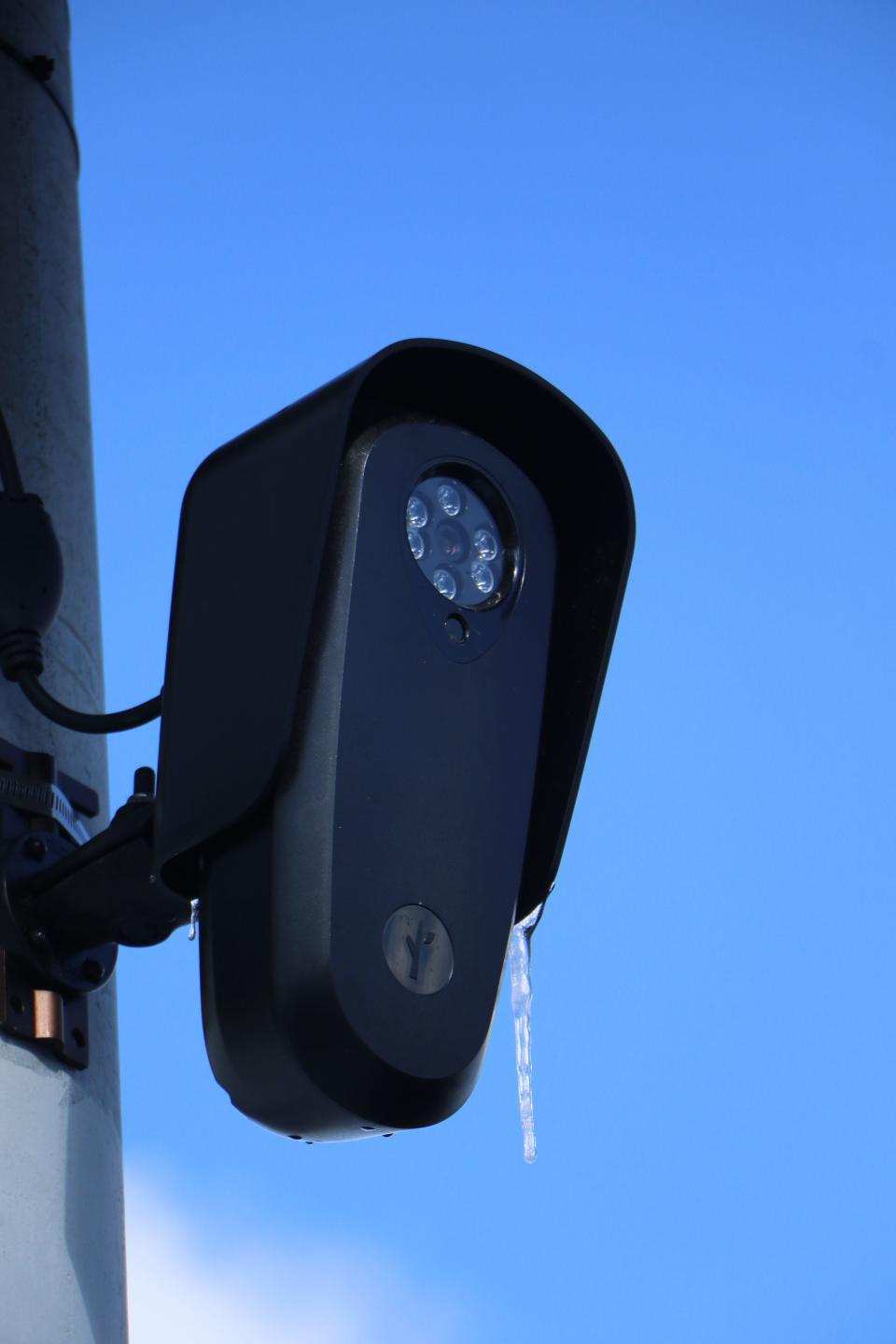Providence may be one step closer to noise cameras. The mayor says 'it's not surveillance.'
Providence Mayor Brett Smiley wants to make the city among the first in the state to deploy noise cameras to catch motorists blasting music and riding with straight pipes.
The move would make Providence the second Rhode Island city to try the audio technology, which uses a camera to snap license plate photos of vehicles allegedly violating the noise ordinance.
Roughly a year ago, it was only a dream considered by City Councilman John Goncalves. Now, Smiley wants the General Assembly's permission to make it a reality, including the measure in his annual legislative package.

'It's not surveillance,' Smiley says. The ACLU disagrees.
Asked in a recent interview whether he and the city's police chief, Col. Oscar Perez, discussed the cameras before the mayor's announcement, Smiley said only that he and Perez had talked about making sure residents follow the noise law.
Smiley also asserted that noise cameras do not fall under the definition of surveillance.
"It’s not surveillance," the mayor said. "We talked about enforcing the noise ordinance from the moment I got elected and [Perez] got appointed. It’s been a top concern of residents for many years, and there’s been a lot of frustration because the noise ordinance has been in place for years but has been rarely enforced."
It is true that the noise law has hardly been enforced in the past. According to a Providence Journal analysis, in 2022, fewer than two dozen citations were issued. Yet the Police Department took roughly 5,500 calls about loud noises.
But the Rhode Island American Civil Liberties Union – a frequent critic of camera technology – disagrees with the mayor's definition of surveillance.
"I think the ACLU kind of considers any technology keeping a record of where people are going in public … inherently has those surveillance qualities," said RI ACLU Policy Associate Hannah Stern. "So when the red light cameras and the speed cameras were deployed, we had the exact same concern."
More: Smiley unveils Providence's legislative wish list: Here's what's on it
Will there be a public hearing? Don't expect a city-level one.
In 2022, when Providence announced it would use Flock Safety cameras – license plate readers that police use to track those they suspect are connected to crimes – reporters were assured by then-Public Safety Commissioner Steven Paré that a public hearing would be held if the Flock program expanded. Yet it did expand, and the decision was made without a public hearing.
Asked whether there would be a public hearing if audio cameras are installed, Smiley said the public could air their comments in the State House.
More: Noisy neighborhoods can be hazardous to Rhode Islanders' health. How it's being addressed.
"The process that we’re going through at the General Assembly provides ample opportunity for public feedback," the mayor said.
But the RI ACLU's Stern felt there should also be a city-level public hearing to tell locals how the program operates and what information is collected. (Smiley has stressed that only license plates would be photographed.)
"I think a public hearing is a really critical part of this process," Stern said. "We have really emphasized and pushed the need for public input in any surveillance expansion."

Don't make a peep: Noise detection cameras coming to Newport. How they work.
Would Providence get more cameras? Or adjustments to existing ones?
From the outset, the mayor's office has suggested that new cameras may not even be necessary, and that perhaps the city's existing cameras could be modified to function differently.
But Flock spokeswoman Holly Beilin confirmed to The Journal that the Flock cameras in Providence "do not currently have the capability to detect audio." In fact, the sole audio-related functions Flock provides are in its "Raven" system, a distinctly different device that captures only gunshots and fireworks.
It was not immediately clear whether red light cameras could be modified to detect noise.
Newport, in its trial run of noise cameras, opted for devices from a European company called Sorama. But the city was able to retrofit an existing police radar trailer to include the sound detection system. In total, the build cost roughly $8,000, said city spokesman Tom Shevlin. The next build, which Shevlin said would include "added tech and licensing fees," is expected to cost nearly $12,000. (Right now, only one noise camera has been set up.)
New York City, which has also started using noise cameras, is paying a much steeper rate at $35,000 per device, according to The New York Times.
What about the noise meters Providence bought?
Providence already budgeted $42,000 to purchase noise meters for police to better enforce the noise ordinance when it comes to businesses such as local nightclubs. But Smiley said those meters are tough to use on traffic.
"You’d have to stand there with noise meter at the moment the vehicle goes by, get the reading, then have a second officer to pull that person over and issue the summons," he said.
Meanwhile, Perez is making do with what he described as a shortage of police officers. There are currently 423 officers on the force, but Perez said he would like to see a total "close to 500." Simply put: Providence police are lacking enough bodies to spend time tracking down every noise violation. It's the city's view – and Perez's – that the cameras could help.
"We need to utilize our officers in a proper manner," Perez said. "Obviously technology is not something that just popped [up] out of the blue. It’s being utilized by major cities … for policing and quality of life issues, such as the noise issues. It’s to utilize our resources in the best possible ways."
Both Newport and New York City's programs are in their infancy, so there isn't much reporting yet on their impact and success rate. But in Knoxville, Tennessee, a city with roughly the same population as Providence, noise cameras picked up about 1,300 cars within just a few months of their use in 2022, according to a report from local TV station WBIR.
Could communities of color see disproportionate impacts?
A 2022 Brown University School of Public Health study showed high levels of noise are concentrated in Providence's South Side, where the majority of the population is either Hispanic/Latino or Black. Should new noise cameras be installed in the city's noise hotspots, they could disproportionately impact neighborhoods of color.
Imran Dharamsi, a senior at Brown majoring in public health and economics, is working on a thesis broadly examining government action on loud vehicles. He noted that "reflecting on the map [Brown] produced last year, it’s clear that if that kind of enforcement is used here, the noise cameras are going to be placed in communities of color disproportionately."
Erica Walker, who teaches epidemiology at Brown and whose students collected the data for the university's 2022 noise pollution study, also raised opposition to the concept of noise cameras in an email "due to uncertainty about where they will be placed and who/if they could disproportionately target."
Again, the city has not said whether new cameras will be installed, or where they would be located.
Perez said noise-ordinance enforcement boils down to following the law.
"As far as targeting specific neighborhoods and people of color, I think it’s pretty much just equipment, a technology that’s going to read decibels, and like the mayor stated, enforce the law," he said.
This article originally appeared on The Providence Journal: Noise cameras in Providence? Mayor Smiley pushing them in his agenda

